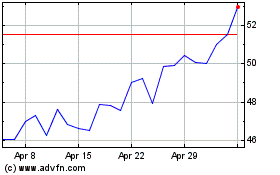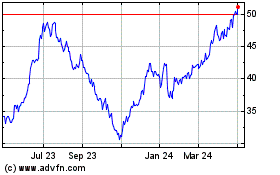Delta to Retire Boeing 777 Fleet to Cut Costs Amid Coronavirus
May 14 2020 - 1:50PM
Dow Jones News
By Alison Sider and Dave Sebastian
Delta Air Lines Inc. said it would remove Boeing Co. 777
aircraft from its fleet by the end of the year, a sign the airline
believes international travel will recover slowly from the
coronavirus pandemic.
Retiring the fleet will help "stop the bleeding" as the airline
looks to conserve cash, Chief Executive Ed Bastian wrote in a
letter to employees on Thursday. Delta is burning $50 million a
day, Mr. Bastian said, a rate the airline wants to reduce to zero
by the end of the year.
U.S. air travel has dropped over 90% from a year ago as fear of
contagion, travel restrictions, and orders that people stay home as
much as possible have chilled demand.
Airline executives have said they believe domestic travel will
be first to resume, as people may feel ready to visit friends and
relatives or take relatively short flights before they will venture
abroad.
In addition to the 777, one of its largest planes, Delta is also
accelerating its retirement plan for the smaller McDonnell Douglas
MD-88 and MD-90s, which will exit the fleet in June, and has parked
more than 650 jets, Mr. Bastian wrote.
That means Delta has more pilots than it needs. John Laughter,
senior vice president of flight operations, told employees in a
separate memo that the airline will likely be overstaffed by 7,000
pilots this fall.
"I recognize that is an alarming number so it's important to
know that our intent is to align staffing for what we need over the
long term," he said, adding that by the third quarter of 2021,
Delta will have between 2,500 and 3,500 more pilots than needed to
fly its schedule.
Any staffing cuts would be a few months away. Airlines are
barred from furloughing or laying off employees through the end of
September under the terms of a federal aid package they received.
But several -- including Delta -- have indicated they expect to
have to shrink.
First Officer Chris Riggins, a spokesman for the union that
represents Delta's pilots, said retiring the 777 and shrinking the
airline's fleet will hinder its ability to benefit when demand for
travel eventually recovers.
The 777 helped transform Delta into a global airline. In 1999,
when it entered the fleet, the plane was uniquely positioned to
operate long-haul international routes, opening up new nonstop
flights connecting Atlanta and Johannesburg and Los Angeles and
Sydney, Chief Operating Officer Gil West said.
Delta has 18 of the aircraft in its fleet and had recently spent
$100 million to refurbish their cabins -- a sign it had planned to
continue flying the planes for years.
But many airlines and industry observers believe it could be
years before travel fully recovers, particularly for long flights.
Delta said its more fuel-efficient Airbus A330 and A350-900 can
handle the job when demand returns. Delta said the A350-900 burns
21% less fuel per seat than the 777s it will replace.
American Airlines Group Inc. told pilots last week that it will
put its Airbus A330-200 planes into long-term storage until at
least 2022, citing the "depressed forecast for international
demand."
Delta said it expects to book impairment charges related to
aircraft retirement of $1.4 billion to $1.7 billion before tax for
the second quarter as a result of the retirements.
Mr. Bastian said the airline has refunded more than $1.2 billion
to customers since the pandemic started, including $160 million so
far this month.
More than 41,000 Delta employees have taken voluntary leaves of
absence, Mr. Bastian said.
Write to Alison Sider at alison.sider@wsj.com and Dave Sebastian
at dave.sebastian@wsj.com
(END) Dow Jones Newswires
May 14, 2020 13:35 ET (17:35 GMT)
Copyright (c) 2020 Dow Jones & Company, Inc.
Delta Air Lines (NYSE:DAL)
Historical Stock Chart
From Mar 2024 to Apr 2024

Delta Air Lines (NYSE:DAL)
Historical Stock Chart
From Apr 2023 to Apr 2024
